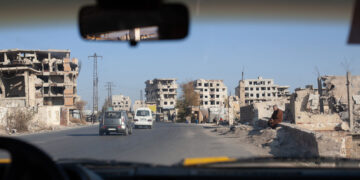Hajar Raissouni is an independent Moroccan journalist.
A Tunisian friend of mine recently commented on the increasing repression in Morocco against independent and critical voices of the Moroccan government, particularly journalists. I told him that the deep state, known as the mekhzen, has been in the vanguard of the repression, targeting dissidents and perceived opponents of the Moroccan government.
The members of this deep state constitute a secret apparatus separate from the government. Its members are unknown to the public, but its tentacles extend throughout the power structures of the country. This apparatus doesn't have an official status, but it is a parallel state within the state, as described by the prominent historian and human rights activist Maati Monjib.
The work of this secret apparatus has become more evident with the assault case brought against journalist Tawfiq Bouachrine, founder of the daily Akhbar Al-Youm, who was sentenced to 15 years in prison. Media websites and newspapers whose editorial line revolves around defamation of independent and opposition journalists convicted Bouachrine even before his trial began. One of these publications is run by a former official in the Ministry of Interior, and another is owned by one of the King's close associates who accompanies him on his African tours.
When Afaf Bernani, the supposed victim of Bouachrine's assault, decided to bravely stand up and say that she had not been assaulted by Bouachrine, and that the party that had pushed her to testify against him was the same party that had falsified her report against him, she found herself on trial herself. For the crime of telling the truth, Bernani was convicted in a summary trial, without the chance to present a defense, and sentenced to six months in prison.
The apparatus of oppression has become increasingly arrogant, deploying the same defamatory websites to announce the charges against independent journalists, and set the dates of their arrests weeks in advance. This is what happened with journalist Suleiman Raissouni, editor-in-chief of the daily Akhbar Al-Youm. One of those websites published a report that Raissouni would be arrested two days before Eid al-Adha. That proved to be true.
Because this secret apparatus considers itself above the law, it often doesn't even bother to keep up the appearance of abiding by the law or proper criminal procedures. The judicial police never summoned Raissouni, before his arrest, and no evidence was presented against him. Indeed, the same website that threatened him with arrest filmed the moment of his detention in front of his house.
The journalist Omar Radi received the same treatment at the hands of this secret apparatus and the same website, which published the date of his arrest a week before it happened. Radi's troubles began when Amnesty International published a report that stated that the Moroccan state was spying on him using the Israeli software Pegasus. The authorities were angered by this revelation and charged Radi with spying for foreign countries and organizations. Radi was interrogated for more than 100 hours within three weeks. When the authorities could find no evidence connecting Radi to spying, they charged him with rape, which has of late become the charge of choice for the Moroccan authorities to go after journalists who criticize the government but commit no actual crimes.
In Radi's rape prosecution, the authorities ran into an obstacle. The supposed victim Imad Stitou's testimony contradicted the prosecutor's case and exonerated Radi of the rape charge. Lack of a victim and a complaint didn't stop the investigating judge from charging Radi with rape.
The repression of the secret apparatus extends beyond independent and critical journalists. After enduring dozens of interrogation sessions over a money laundering charge, historian Maati Monjib, a prominent and long-time critic of the government and human rights activist, was arrested in a restaurant while having lunch in the capital Rabat in Hollywood fashion. Despite the long leadup to the arrest, the authorities didn't bother to comply with the most basic rule of criminal procedure, failing to refer the case to the investigating judge to obtain an arrest warrant before the dramatic arrest.
One month after his arrest, Monjib was convicted of endangering internal state security and fraud, and sentenced to one year in prison. The interesting thing in Monjib's case is the conflict that occurred amidst the authorities, as the Supreme Council of the Judiciary, which regulates the judiciary and whose members are appointed by the Moroccan King, issued a statement critical of the verdict, describing "fallacies and attempts aimed at politicizing a case related to the public right and violating the due respect for the judiciary." The Council is an administrative authority and is normally not entitled to express opinions on cases before the courts.
With the passage of time, the work of this apparatus has become more organized, intimidating, coherent, and more open. It targets every voice of criticism and endeavors to destroy their reputations and prosecute them under the pretext of protecting the rights of women or protecting the conservative structure of society. This apparatus has now turned its focus on me, accusing me of having an abortion, defending homosexuality, a crime in Morocco,, and of seeking funds from international.
Photo credit: Supporters of Moroccan journalist Hajar Raissouni gather outside the courthouse where she was on trial, for the charges of having an abortion and having sex outside of marriage, in Rabat, Morocco, Sept. 9, 2019. (Photo by Fadel Senna/AFP via Getty Image)





































